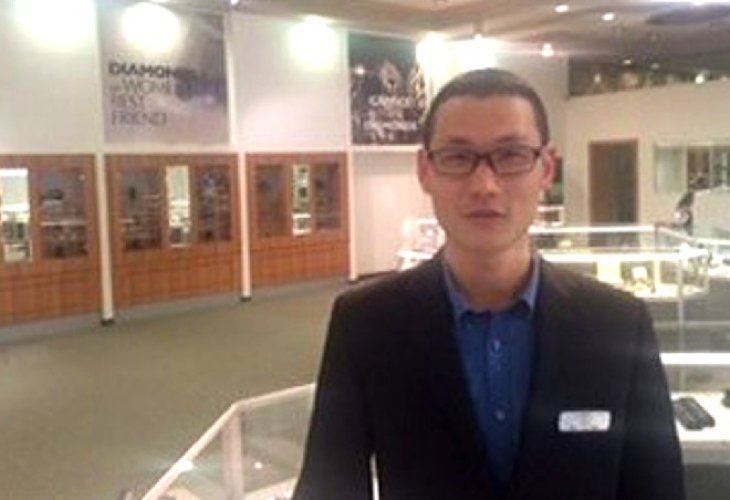Personal Stories
Jacob Wang: “I Want to Be the First Chinese Rabbi”
A young man from Kaifeng’s ancient Jewish community sets out to restore tradition, study Torah and become a leader for the next generation
- Shira Dabush (Cohen)
- |Updated

"I always felt different from other Chinese people. Deep inside, I knew that my roots came from a special people none other than our holy ancestors, Avraham, Yitzchak, and Yaakov," says Jacob Wang as we begin our interview. Because of technical limitations, we speak remotely, even though Jacob is now living in Israel.
Jacob Wang, 29, is a descendant of the ancient Jewish community of Kaifeng, China. Historians believe this community was formed over a thousand years ago when Jewish merchants arrived from Persia and India and chose to settle in Kaifeng.
At its peak, the Kaifeng Jewish community had a beautiful synagogue, a vibrant Jewish life, and many active families. But over time, assimilation took its toll. Today, only around a thousand people in Kaifeng identify as having Jewish roots, most of them holding onto bits of tradition without formal Jewish education.
What is it like to be Jewish in China?
“In our home, we don’t eat pork, blood, or certain seafood. That alone makes many people in China assume we’re Muslim,” Jacob explains. “But we know the truth. We have a mezuzah on our door, and we try to keep whatever Jewish practices we know about. That’s how we hold on to our heritage.”
In Chinese culture, Jewish identity is often linked to the father, while according to halacha (Jewish law), Judaism passes through the mother. Because of this, Jacob and others like him have undergone halachic conversion. He completed his conversion about two years ago and has since spent much of his time in Israel, learning Hebrew and sacred Jewish texts.
His dream? To become the first Chinese-born rabbi in over 150 years.
“In China, we tried to learn Hebrew, but it was very hard without qualified teachers,” he says. “About ten years ago, Jews from around the world started visiting Kaifeng. They taught us how to make Kiddush on Shabbat, how to conduct a Passover Seder in both Hebrew and Chinese, and how to begin keeping more mitzvot, Jewish commandments that we had longed to observe but didn’t know how.”
Then, the organization Shavei Israel, led by Michael Freund, stepped in to help. “They did wonderful things for us,” Jacob says with gratitude. “Thanks to them, Kaifeng Jews learned more about their identity. They even helped many of us make aliyah, move to Israel and live proudly as Jews.”
Jacob’s conversion may have been recent, but his mission is clear and unwavering. He hopes to be ordained as a rabbi and bring Torah back to his ancient community.
And what do his parents think?
“They support me. They’re proud that I want to study Torah, grow spiritually, and become a rabbi,” he says with a smile.
Isn’t it intimidating to take on such a responsibility at such a young age?
“Maybe I’m young now, but after I gain knowledge and experience, with Hashem’s help, I believe I can do it,” Jacob replies with confidence. “Thanks to Shavei Israel, which sponsors my stay and Torah studies in Israel, I’ve been given a real chance to fulfill this dream.”
After high school, Jacob began university studies in China. But once he discovered the beauty and depth of Torah, that’s all he wanted. “I love Judaism. I love learning Torah. What amazes me is how many Jewish ideas align with traditional Chinese values. From our history, I learned that the Kaifeng community lost its connection to Judaism because, after the last rabbi passed away 150 years ago, no one continued his work. I want to be the one who brings it back. I want to reach every Jewish descendant in Kaifeng and help them rediscover who they are.”
What does he think about aliyah?
“I believe it’s very important,” Jacob says thoughtfully. “It strengthens our people and unites us. But I also think it’s important for those who remain in China to serve as an example to keep learning, growing, and staying connected. Because if we have emunah (faith) in Hashem, we can live as Jews wherever we are.”
Do non-Jews in China treat you differently? Have you experienced antisemitism?
“Baruch Hashem (thank G-d), there’s no antisemitism in China. Actually, many people are very friendly and curious about Judaism. They’re surprised to hear that a Jewish community has survived in China for over a thousand years.”
Still, one challenge remains.
“Kosher food is very hard to find. Food is a big part of Chinese culture, like in Israel. And people often invite each other for meals. Since many traditional Chinese dishes contain pork, we can’t eat them. But I believe Hashem will help me find solutions for that too especially when I become a rabbi.”
As he continues his studies in Israel, Jacob is not only pursuing personal growth, but preparing to bring Jewish life back to Kaifeng.
And all we can do is cheer him on and say: may you succeed in your journey and help light up Jewish souls in places far from home.

